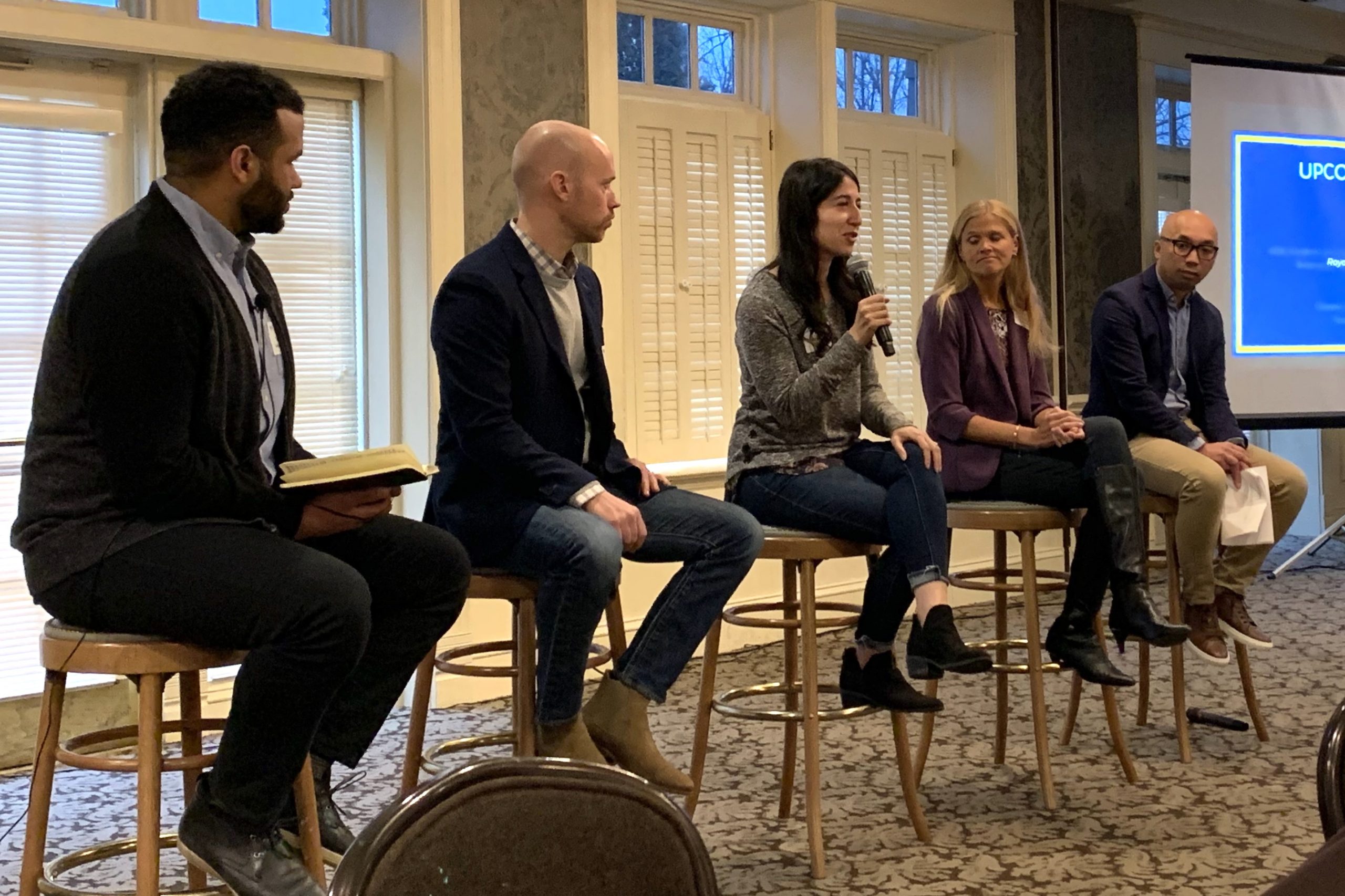Taji Onesirosan ’17 wants to share about the great work being done by human resources. He starts with a pop culture misconception: “It is not Toby from ‘The Office,’ he says with a laugh. He’s referring to Toby Flenderson, the HR worker who was Michael Scott’s nemesis on the hit show—often for no reason. Instead, Onesirosan wants people to know that HR workers often serve in key roles that act as a bridge between company leadership and employees.
At a recent BUnited Breakfast—a series that offers networking opportunities and addresses relevant topics on the workplace and leadership—Onesirosan moderated a panel of several Bethel alumni working in human resources. They reflected on their roles, COVID-19, how the job market has changed, and what that means moving forward.
Here are a few takeaways from Onesirosan, senior compensation business partner at Target, and the panel, which included: Director of Human Resources at BWBR Tricia Eiswald CAPS’12; Director of Client Partnerships for HR Interim Solutions at Versique Search and Consulting Jon Koss GS’18; Vice President of Human Resources at Slumberland Furniture An Nguyen ’05; and Chief People and Culture Officer at The Stable Stephanie Propp ’05.
The job market is forever changed.
We may never truly go back to “normal.” Since COVID-19 and the “Great Resignation,” the HR professionals see a changed market—and a changed candidate pool. Many employees are now looking for flexibility and roles that offer at least a hybrid of working from home and working from an office. Others are valuing wellness efforts from employers, and Koss notes many people are looking to work for companies whose values align with their own.
Culture is also vitally important. Prospective employees can often get a quick sense of culture during an interview. Nguyen also notes that many prefer for potential employers to cut to the chase and get candidates in front of a leader right away. After all, they’re selling the company just as potential workers are selling themselves. During the last few years, Propp has seen a “no working” theme where some prefer freelancing and consulting jobs over more traditional roles within companies. Still, she notes many candidates are still interested in the highest paying jobs.
Development is key.
Especially after the “Great Resignation,” many employees are valuing roles with professional development opportunities. Eiswald is working to build a better plan for employee development after BWBR saw employees leave for other jobs where advancement opportunities are laid out in clearly defined steps. She says companies need to not only provide employees with opportunities for development and career advancement, and they need to clearly communicate it to employees. “You need to have a plan for every single person that you’re working with,” she says. “You need to make sure they know what the plan is and that there are people around them supporting and actively working that plan so they know you’re not just blowing smoke.”
Diversity, equity, and inclusion efforts are vitally important.
Along with the pandemic, the HR professionals point to another paradigm shift in recent years: an increased awareness of social justice after the death of George Floyd. It’s driven many companies to refocus their diversity, equity, and inclusion efforts. But Nguyen, the first minority executive at Slumberland, notes that sitting out wasn’t an option. Still, he admits diversity, equity, and inclusion topics are not always easy to address. Most efforts are met with some thinking the company is doing too much, while others think they’re not doing enough.
Working at a company largely based in smaller rural towns with a more conservative employee base, Nguyen’s approach to DEI efforts has been to make it a journey and take it slow. “We realized this is going to be a journey,” he says, adding he didn’t consider it fair to drop a complex subject on people without the proper steps leading up to it. Early efforts centered on treating everyone with love, dignity, and respect—something nearly everyone can agree on—and they only recently moved on to a deeper discussion around unconscious bias.
Companies can lead efforts to build a thriving culture at home.
Moving forward, it will be important for companies to find new and unique ways to build a work community in a changing environment. But the HR professionals have already been taking steps to build a thriving culture with some employees working from home. Nguyen sends out weekly emails to keep people connected and engaged. He usually includes a fun question as an ice breaker and kudos to call out successes. Propp notes that larger companies don’t need to focus on keeping “everyone” connected. Efforts can be more defined at the team level with individual managers keeping teams of eight to 10 people connected by investing in happy hours or events for smaller groups.
Bethel offers several options for students interested in business and human resources careers, like our traditional undergraduate B.A. in Business: Human Resource Management, our online undergraduate B.S. in Business Management, and our Master of Business Administration.

